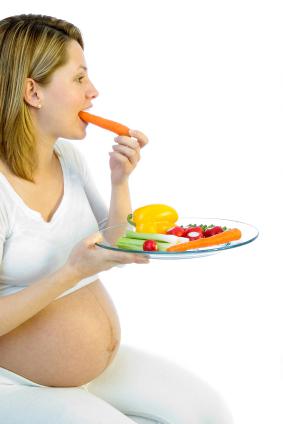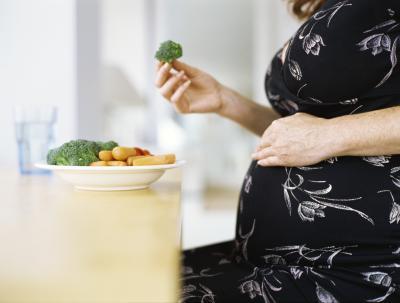
Pregnancy is a big responsibility and this includes choosing healthy food! The health of your baby begins at the moment of conception. Nutrition is important before, during, and after pregnancy to ensure a healthy baby and a healthy mom. All of the nutrients needed to properly develop your baby come from the food you choose to eat. It is, therefore, easy to understand why the Dietary Reference Intakes (DRI's) for most nutrients increase during pregnancy - some almost double! because the need for calories is only slightly higher (by about 300 calories per day) you must make wise food choices. The goal is to eat highly nutritious food while avoiding excessive calories, fat, and sugar. Choosing nutritious food will help lower the risk of chronic diseases such as obesity, diabetes, heart disease, hypertension, and osteoporosis that many women may face after pregnancy and later in life. Expectant mothers have the responsibility of eating right to maintain the health of the developing baby while maintaining their own health and well-being.
Recommended Number of Daily Food Group Servings Made Especially for Pregnant Women
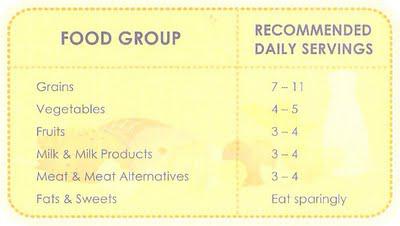
Grains are the largest section of the pyramid because you should have the highest number of servings from this group. Grain foods provide complex carbohydrates, the primary energy supply for your body. They are also high in fiber, low in fat, and a good source of many vitamins, especially Vitamin B that is needed for energy metabolism and tissue development during pregnancy. Grain foods include pasta, bread, rice, cereal, and oatmeal.
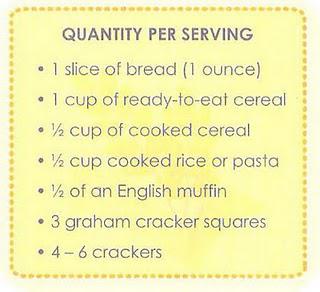
Fruits and Vegetables
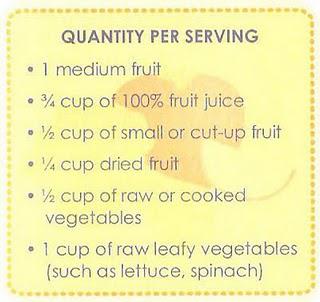 Fruits and vegetables provide numerous vital nutrients. Vegetables are a good source of folate and zinc needed for new cell growth and development, and iron for a greater blood supply. Fruits are rich in Vitamins A and C and potassium. These vitamins support cell growth of a developing fetus. Both fruits and vegetables also contain fiber, which helps reduce constipation.
Fruits and vegetables provide numerous vital nutrients. Vegetables are a good source of folate and zinc needed for new cell growth and development, and iron for a greater blood supply. Fruits are rich in Vitamins A and C and potassium. These vitamins support cell growth of a developing fetus. Both fruits and vegetables also contain fiber, which helps reduce constipation.Milk and Milk Products
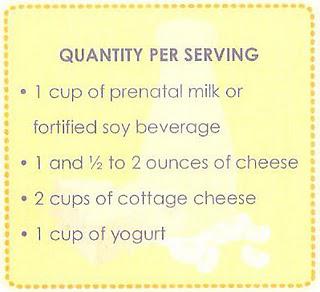 Anmum and other dairy products supply you and your developing baby with important sources of calcium, phosphorous, Vitamin D, magnesium, and protein. Your baby needs calcium for proper bone and tooth development. Phosphorous is vital for building muscle tissue, while magnesium helps aid cell development. Milk products are a good source of protein.
Anmum and other dairy products supply you and your developing baby with important sources of calcium, phosphorous, Vitamin D, magnesium, and protein. Your baby needs calcium for proper bone and tooth development. Phosphorous is vital for building muscle tissue, while magnesium helps aid cell development. Milk products are a good source of protein.Meat and Meat Alternatives
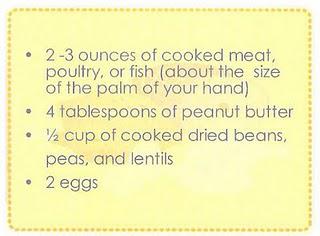 Meat and meat alternatives such as eggs, seafood, nuts, peanut butter, tofu, dried beans, and legumes are great sources of protein. Protein is needed during pregnancy to support tissue growth and development of the unborn baby, Iron and zinc are important minerals found in meat.
Meat and meat alternatives such as eggs, seafood, nuts, peanut butter, tofu, dried beans, and legumes are great sources of protein. Protein is needed during pregnancy to support tissue growth and development of the unborn baby, Iron and zinc are important minerals found in meat.Fats and SweetsFats and sweets are not considered a food group, but they are represented at the top of the pyramid. These provide additional calories but do not contain significant amounts of vitamins and nutrients. Therefore, these should be eaten in moderation because they often lead to excessive weight cakes, potato chips, salad dressings, mayonnaise, and soda pop. Of course, pregnant women do not have to entirely stop eating these, just eat them in moderation and choose healthy alternatives like pretzels instead of chips.
Some other important nutrients and vitamins that are needed during your pregnancy.
Iron
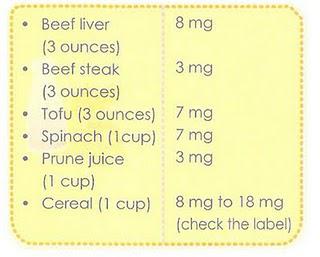 If you are pregnant, you need double the amount of iron! Choosing food that are good sources of iron helps provide sufficient iron for the blood supply and iron stores for your developing baby. Red meat and dark green leafy vegetables are good sources of iron. While you are pregnant you need about 30mg of iron daily.
If you are pregnant, you need double the amount of iron! Choosing food that are good sources of iron helps provide sufficient iron for the blood supply and iron stores for your developing baby. Red meat and dark green leafy vegetables are good sources of iron. While you are pregnant you need about 30mg of iron daily.FolateFolate (or folic acid) is a B-vitamin which is essential for the formation of new and normal tissue. It is also needed in the formation of red blood cells. Your need for folate increases to 600 mg per day during pregnancy, because this is a time for rapid tissue growth and blood formation for you and your baby. Folate is particularly necessary to protect your baby from neural tube defects (NTDs). An NTD occurs when the neural tube, which goes on to become your baby's brain and spinal cord, does not form or 'close' properly. When this happens, the baby may be born without a brain (anencephaly), which is fatal, or with a damaged spinal cord (spinabifida), which can result in paralysis. Closing of the neural tube happens in the first month of pregnancy, so it is important to take folate early in your pregnancy. And because getting folate from yoru diet alone will be insufficient, it is important for you to take fortified foods or supplements like Anmum to ensure that you get enough folate, not just to help prevent NTDs and other birth defects, but also to sustain your folate needs throughout pregnancy. 2 glasses of Anmum everyday provide 100% of your folate requirement during pregnancy.
EFA and DHAEssential Fatty Acids are the building blocks or precurors of DHA (DocosahexaenoicAcid). That is important for the normal development of the cell wall of baby's brain, eyes and nerve cells. EFA from a mother's diet is converted to DHA and then passed on to the baby through the placenta. Depletion of DHA from the fetal brain and retina is associated with reduced visual function and learning deficits, showing the importance of adequate maternal EFA intake during pregnancy.
